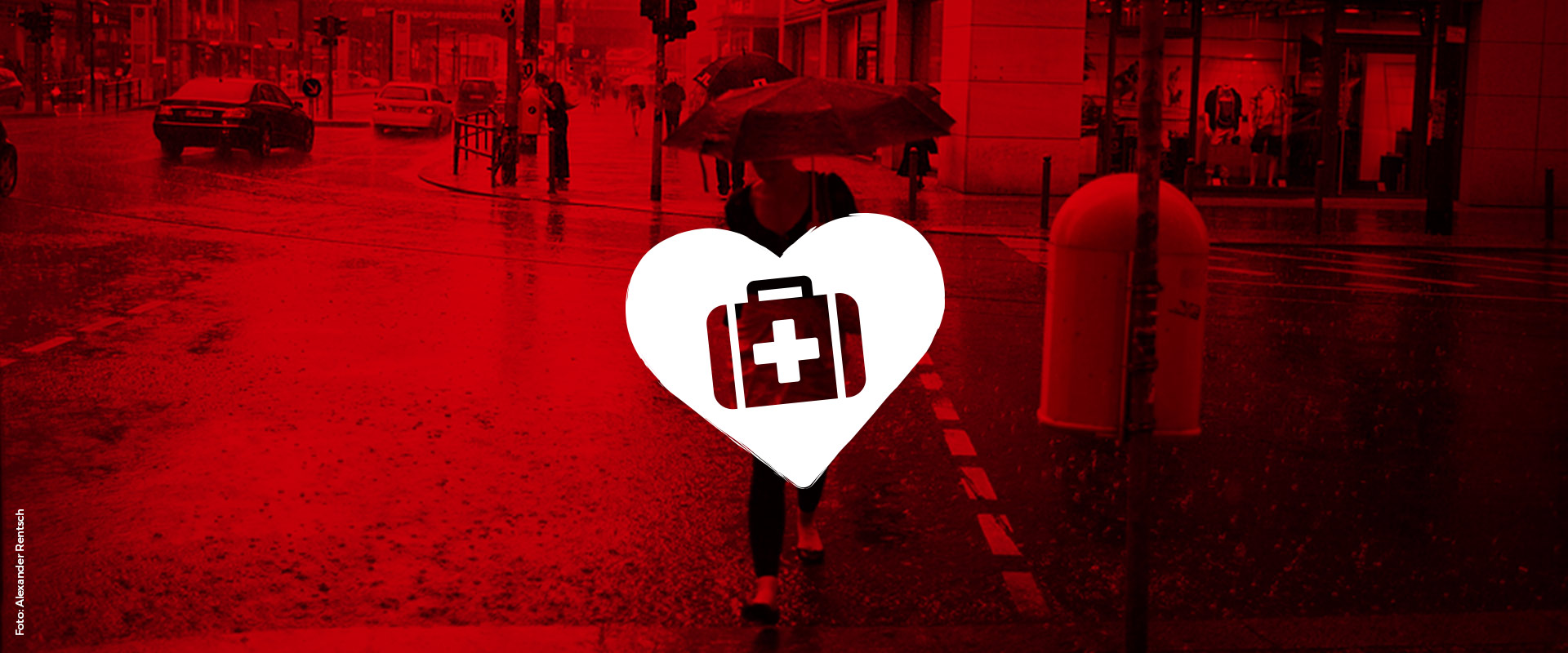
By the time we finalized our first demands, the municipal elections of 2016 were just around the corner.
Leading up to the election, we reached out to the parties participating in the elections, and asked them what they planned to do about providing healthcare to all of us, not just some of us. The parties that currently form the government responded positively, generally speaking, but with a certain vagueness about promising to “fill the gaps.”
After being elected, the new Red-Red-Green Coalition declared their intent to implement some kind of anonymous health coverage into their coalition contract. No concrete solutions were agreed upon so the Berlin Senate Department of Health, Care, and Gender Equality invited a number of civil society organizations to a roundtable in order to collect information on possible strategies to develop anonymous health coverage.
We joined a secondary roundtable that intended to give input from people actually affected by the lack of health coverage to the first roundtable. At first the conversations revolved around what we can’t do. Some of us were paralyzed by the complexity of the issue. After reflecting for some days on all the things we can’t do, Solidarity City Berlin took a minute to step back and think.
How could it be that politics is defined by vague limitations and abstract obstacles an administrative nature? It didn’t feel right that we weren’t pushing for the maximum we could think of from the get-go, that we were actually retreating before the battle ever began.
So as we faced a technocratic roadblock and we moved around it. We contacted everyone involved in both roundtables as well as organizations potentially interested about the proposal we ourselves developed. We criticized the limitations that had already been established and proposed alternative solutions and offered the results of our very own research amongst those who will need the anonymous health coverage.
And while we certainly did not get all we would have loved to see, we were at least able to impact the negotiations and to raise awareness on the problems an anonymous health coverage can provoke if not planned well. After the insecurity of stepping into the field of technocrats, we have to say it turned out that an alliance of everyday people can actually generate their own policy proposals.
This is what they came up with:
- The concept should offer an anonymous health card or – as an alternative – a «Krankenschein» for one quarter. A Krankenscheine is a pass that allows potential patients to see heath care providers, and are typically given on a case-by-case basis. Krankenscheine given per case/illness delay the medical treatment and pose an unnecessary hurdle to those seeking health services.
- For such a solution an open, unfixed financial coverage of the project is vital. Currently there are no reliable numbers or predictions regarding how many people will need the anonymous health coverage in Berlin. Hence, the amount of money needed in a limited fond cannot be predicted. Additionally the limited fund solution would put an extreme pressure to control the organization that distributes the health card/Krankenschein. The potential denial of card/Schein without a thorough medical examination has been proven to be extremely problematic in the past. Flüchtlingsrat Berlin, the campaign “Health for Refugees» (Gesundheit für Geflüchtete) and the network «EQUAL» from the University Osnabrück have documented over years the problems that resulted from case-based Krankenschein distribution with limited financial backup for refugees.
- People need coverage according to the regulation for German health insurances (Regelversorgung) without the limitation from §4 and §6 AsylbLG. The exclusion of chronic as well as psychological illnesses is not based on any medical argumentation. The attempt to force people out of the country by denying them basic medical coverage is contrary to the basic human right for health and does the urban community a grave injustice.
- There has to be a liberal permission system since illegalized people frequently lack the papers to prove their status. Additionally, the program should cover not only illegalized people but also for example European refugees (like the Sinti and the Roma) who are frequently excluded from the health system,as well as German citizens who «fell through the cracks of the system». Refugees who have limited coverage based on §4 and §6 AsylbLG should have the right to use the anonymous coverage for health problems that are excluded from their insurance.
- The distribution has to be organized by a non-state institution that already has connections to the communities that will use the system. The people who will be using the system should be included in the process of implementing it. In order to develop a functioning system that includes the experience of the people affected, an advisory board should be implemented.
- Translations are a vital element for a successful treatment, they should be included in the financial planning of the project.
- There will be financial resources needed for sensitivity training for medical personnel. Our sample inquiry has shown that in some situations structural racism, communicative problems, as well as different medical cultures lead to conflicts which in consequence prevent people from seeking the treatment they need. Raising awareness for these problems amongst medical personnel would be an easy way to solve this issue. In this context, it should be addressed that refugees might suffer from particular health issues, such as Post Traumatic Stress Disorder (PTSD).
- The project needs to include an information campaign for those who will be able to use the health coverage. Projects in other cities had difficulties to spread the knowledge on the question who exactly can get what kind of coverage through the anonymous health coverage.
Is the current plan everything we need? No. Is it a good start? Sure. Time to pack up and go home? Absolutely not. Already due to the pressure Solidarity City Berlin and other organizations have generated, the government has been forced into filling in gaps of coverage. If we hadn’t been there not only to develop pressure, but to demand our own proposal that we think solves the problem, where would a solution come from?
Now is the most critical time. Beginning in September, the city of Berlin will negotiate its budget plans and even the best of proposals with the biggest group of fans will not become reality without decent funding. If we don’t continue to generate pressure and to mobilize people, then what is to guarantee that this already watered-down proposal will not just fall off the table altogether?
This is why we have to continue pushing the envelope, continue demanding more, and continue fighting harder.

